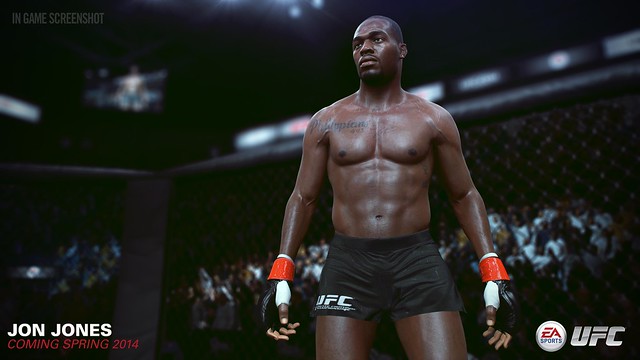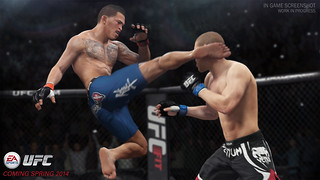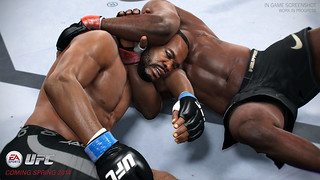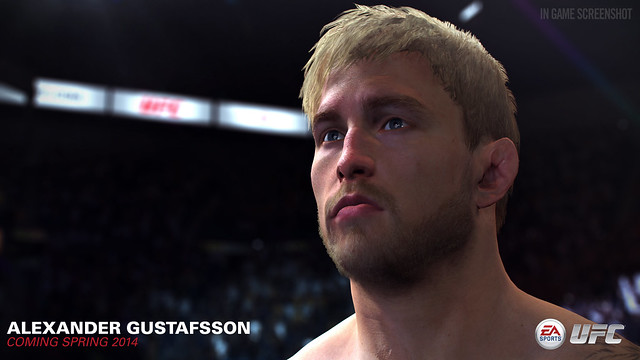
Jon Jones and Alexander Gustafsson circle each other warily in the octagon. Gustafsson leans on his rear foot, his toes spreading subtly under the weight; Jones shuffles forward, his shoulders clenching as he adopts a defensive position. Soon, the fighters trade blows, leaving livid bruises on each others’ bodies and blood stains on the floor.
This agonizing level of visual detail is just one of the many ways that EA Canada aims to make players feel the fight in the team’s first official UFC licensed game, EA Sports UFC. It launches this spring, and it’s coming to PS4.
We went hands-on with an early build of EA Sports UFC running on PS4. What we played showcased the developer’s commitment to creating an authentic MMA fighter. And since the team is comprised of Fight Night series veterans, they’re bringing a vast body of knowledge to EA Sports UFC.
Because EA Sports UFC is built for PS4′s hardware, there’s no legacy code to compromise the visual realism. Each fighter has been scanned in using EA’s proprietary technology, reflecting exact body dimensions, tattoos, and skin tone in painstakingly detailed character models. The team even added real-time reflections of the environment onto the cornea of each fighters’ eyes.


The real-time body deformation on display brings a more lifelike look to the fighters. Here, when a fighter is struck, his flesh ripples convincingly. When two competitors grapple on the ground, their muscles flex and clench against each other.
In terms of play, EA Sports UFC aims to streamline MMA fighting in a way that softens the learning curve and opens up new strategic potential without sacrificing depth. The face buttons on DualShock 4 control each limb of the fighter, much like the Tekken series. Square for left arm, Triangle for right arm, and so forth. This intuitive control scheme bestows players with more than 200 different striking animations, just by pressing a face button and a direction.
Blocking is assigned to R2; pairing R2 with a corresponding face button will cause the fighter to parry a punch or kick, opening up an opportunity for a painful retaliation. Location-based damage also brings new possibilities. Take too much punishment to the leg, for example, and your fighter will develop a limp and have a harder time navigating the octagon. A handy diagram at the top of the screen tracks limb and torso damage.
Grappling is a fundamental factor in almost any MMA match, and here it falls under the jurisdiction of R1 and the right analog stick. EA Sports UFC aims to simplify the ground game too, enabling fighters to swap positions quickly and seamlessly by rotating around their opponents’ bodies using the right stick. The submission minigame is a high-stakes affair, throwing both the defensive and offensive player into a competition of speed and reflexes.

When a player attempts a submission, the defending player works to escape by pushing the right stick in one of the four cardinal directions, while the attacking player tries to match his movements to stop that escape. Simultaneously, the attacking player must match his or her left stick with flashing prompts on screen to advance the submission.
Considering the richness of MMA and the strategies therein, the potential for multiplayer here is tremendous. Fortunately, EA Sports UFC will support both local and online multiplayer, along with single-player career options. Meaning there’s more than enough room for EA Canada to showcase its knowledge of — and dedication to — the sport.
Related Posts:
- Rumor: Battlefield 4 Second Assault rolls out next week - joystiq
- EA Sports Shows Off its In-Game UFC Fighters - giantbomb
- New trailer: EA Sports UFC. - kotaku
- Battlefield 4: Second Assault DLC Release Date Leaks - IGN
- The Game Bakers talk Squids Odyssey Wii U/3DS differences, release date, sequel, future support - GoNintendo